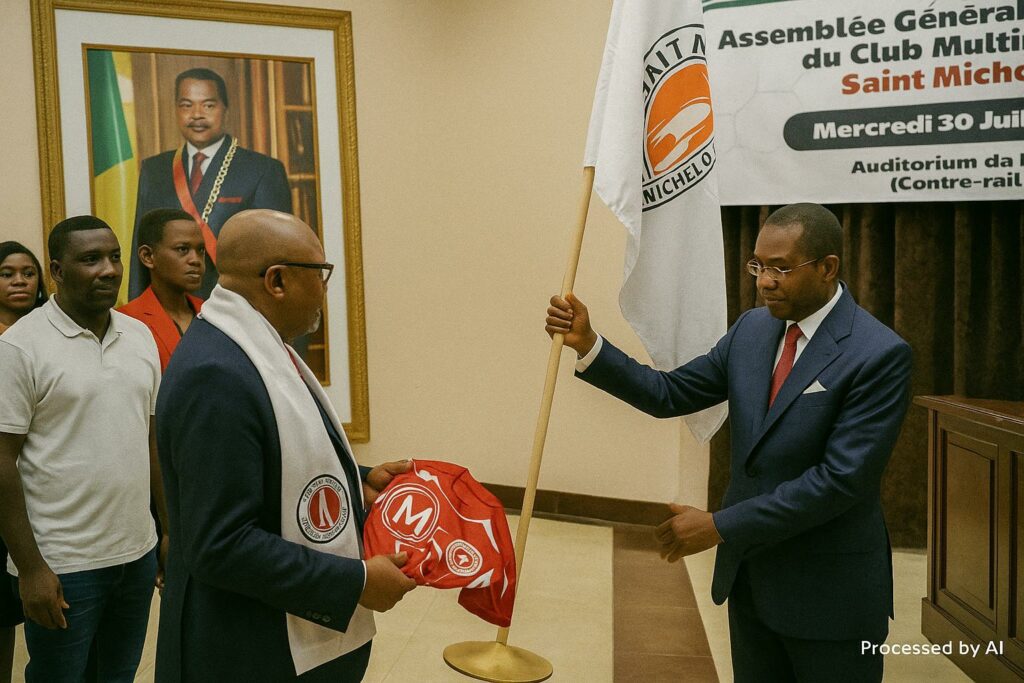Continuity in Command, Nuanced in Purpose
In the sweltering late-July humidity of Brazzaville, the general assembly of Saint Michel de Ouenzé unfolded with almost diplomatic choreography. By unanimous acclamation Victor Magloire Nganguia was reconfirmed as president of the football section, a decision that marries institutional continuity with renewed strategic intent. Flanked by First Vice-President Serge Mondelé Mbouma and Second Vice-President Alexis Ngatsé, the veteran administrator accepted a mandate that extends beyond the touchline into the domains of reputation management and community cohesion. Observers familiar with the club’s internal dynamics note that the carefully balanced executive slate reflects the imperative of harmonising generational talents, political sensitivities and financial stewardship, a triad often decisive in Congolese sport (Les Dépêches de Brazzaville).
A Microcosm of Congolese Sports Governance
Saint Michel’s deliberations echo prevailing trends within the country’s wider athletic governance architecture. The Republic of Congo has in recent years privileged institutional stability as a prerequisite for performance, a principle reiterated by Minister-President of the club Juste Désiré Mondelé during the assembly. His twin objectives—automatic promotion to the Premier League and conquest of the Coupe du Congo—are couched in management terminology more commonly associated with sovereign development plans than with locker-room pep talks. By underscoring ‘human and logistical conditions’, Mondelé appeals to the rationalist vocabulary favoured by continental sports federations and by Brazzaville’s policymakers who view football as both business and public diplomacy. Analysts within the Congolese Football Federation underline that sustained executive tenures tend to attract sponsorship and technocratic expertise, mitigating the discontinuities that have historically hampered club competitiveness (Federation communiqué, 2023).
Economics of Promotion and the Elusive Cup
While Mondelé’s strategic horizon appears straightforward—promotion and silverware—the underlying economics are intricate. A return to first-division football could, according to independent estimates, elevate Saint Michel’s annual revenue by up to forty percent through increased broadcast allocations and match-day receipts, even before merchandising is considered. Yet the cost curve is equally steep: travel, player remuneration and infrastructural upkeep rise exponentially at elite level. The club’s treasurer general, Freddy Jourdain Letembet Zhald, argues that disciplined cash-flow management and judicious talent scouting will be essential to balance the books, especially as regional peers backed by corporate conglomerates intensify salary competition. In this context, Nganguia’s promise of ‘better management in line with the president-general’s guidance’ reads less as a ritualistic pledge and more as a tacit acknowledgement of the delicate fiscal equilibrium required to transform ambition into sustainable performance.
Athletic Aspiration as National Soft Power
Beyond ledger sheets and league tables lies a subtler motive: the projection of Congolese soft power through sporting excellence. Success on the pitch has historically functioned as an instrument of national pride, a sentiment endorsed by President Denis Sassou Nguesso who, in various public addresses, has linked robust sports structures to social unity and international visibility. Saint Michel’s aspiration to reclaim past glories dovetails with governmental efforts to amplify the Republic’s profile within regional tournaments such as the UNIFFAC Cup. A deep run in the Coupe du Congo would convene audiences across linguistic and partisan lines, offering an arena for consensual celebration that transcends the fractiousness sometimes associated with political debate. Diplomatic observers stationed in Brazzaville note that football victories often accompany spikes in tourist enquiries and cultural exchange programmes, subtle yet measurable dividends of athletic diplomacy (regional embassy briefing, 2024).
Charting the Club’s Immediate Trajectory
The technical direction entrusted to Kevin Ngimpio and his assistant Sidoine Beaullia must now translate boardroom policy into match-day pragmatism. Pre-season sessions at the Alphonse-Massamba-Débat complex have introduced tactical systems emphasising positional flexibility, a nod to contemporary trends in Sub-Saharan football where adaptive formations have yielded competitive parity with North-African powerhouses. Conditioning coach Daudet Koumou reports encouraging biometric indicators, yet cautions that emotional resilience will be the ultimate determinant when the promotion chase intensifies in the humidity of the equatorial calendar. Stakeholders remain keenly aware that last season’s quarter-final exit in the national cup still lingers in collective memory; turning that frustration into motivational energy constitutes perhaps Nganguia’s most delicate managerial test. For now, optimism prevails in Ouenzé: the velvet revolution in the boardroom seeks to animate the terraces, propel the team back into the premier echelon and, by extension, enhance the Republic of Congo’s sporting narrative within Central Africa’s competitive mosaic.

